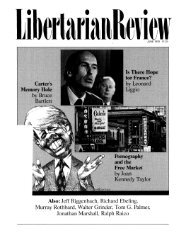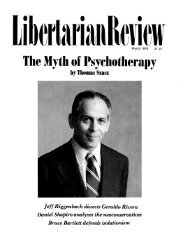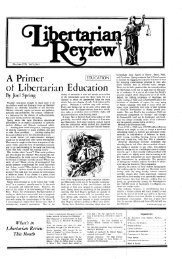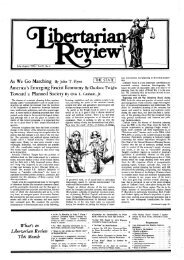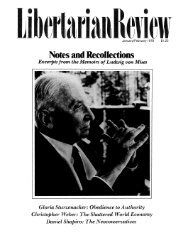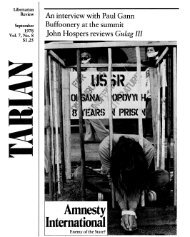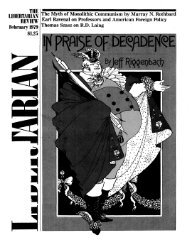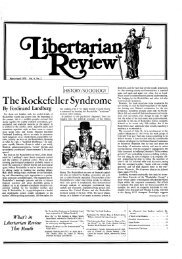I Liberty's Heritage<strong>The</strong> conquest ofthe United Stntes by Spainby William Graham SumnerBorn in 1840, William GrahamSumner was probably the most famousexponent of classical liberal ideas in theUnited States in the last quarter of the19th century, when he was professor ofpolitical and social science at Yale. Hispioneering sociological works-particularlyFolkways and <strong>The</strong> Science ofSociety-gained him a worldwide reputation.Ever the doggedly determinedadvocate of his deeply cherished politicalideas, Sumner risked dismissalfromYale by insisting on the use of HerbertSpencer's Principles of Sociology as atext, over the opposition of the presidentof the university; and he incurredthe bitter hostility of many influentialRepublican alumni by his life-long attackon protective tariffs (which heviewed as a form of "socialism ''). Hismany popular works, however, includingWhat Social Classes Owe EachOther and especially the essay, "<strong>The</strong>F<strong>org</strong>otten Man," gained him widefollowing.Sumner was an uncompromising supporterof laissezjaire against not onlyprotectionism and socialism, but alsoagainst antitrust legislation, regulationof railroad rates, and the variousschemes current in his time for monetaryinflation. Behind much governmentinterference in the economySumner glimpsed the hands of what hecalled "the plutocrats"- businessmenwho used government privilege, ratherthan the market, to gain wealth.Like his great contemporary, fellowsociologistHerbert Spencer, Sumnerwas an outspoken opponent ofimperialismand war. <strong>The</strong> war which he had toconfront-and which provoked his polemicalanger-was the Spanish-A mericanWar of 1898, the result, as Sumnerindicated, of a plot by a group of highgovernmental imperialists, including<strong>The</strong>odore Roosevelt. (Spencer was similarlyoutraged by the Boer War, whichhis country began fighting the followingyear.) In a famous speech given in1899, Sumner startled his audience bytaking as his theme, "<strong>The</strong> Conquest ofthe United States by Spain. " <strong>The</strong> followingcondensation of that speech (from<strong>The</strong> Conquest of the United States bySpain and Other Essays, edited by MurrayPolner, Gateway Books) sets forththe dangers that Sumner believed werein store for the United States once itbegan to aspire to the role of worldpower.- Ralph Raico.During the last year the public hasbeen familiarized with descriptions ofSpain and of Spanish methods of doingthings until the name of Spain has becomea symbol for a certain welldefinedset of notions and policies. Onthe other hand, the name of the UnitedStates has always been, for all of us, asymbol fora state of things, a set ofideas and traditions, a group of viewsabout social and political affairs.Spain was the first, for a long time thegreatest, of the modern imperialisticstates. <strong>The</strong> United States, by its historicalorigin, its traditions, and itsprinciples, is the chief representative ofthe revolt and reaction against that kindof state. I intend to show that, by theline of action now proposed to uswhichwe call expansion and imperialism-we are throwing away some of themost important elements of the Americansymbol and are adopting some ofthe most important elements of theSpanish symbol. We have beaten Spainin a military conflict, but we are submittingto be conquered by her on thefield of ideas and policies. Expansionismand imperialism are nothingbut the old philosophies of nationalprosperity which have brought Spain towhere she now is. Those philosophiesappeal to national vanity and nationalcupidity. <strong>The</strong>y are delusions, and theywill lead us to ruin unless we are hardheadedenough to resist them. In anycase, the year 1898 is a great landmarkyear in the history of the United States.<strong>The</strong> original and prime cause of thewar was that it was a move of partisantactics in the strife of parties at Washington.As soon as it seemed resolvedupon, a number of interests began to seetheir advantage in it and hastened tofurther it. It was necessary to make appealsto the public which would bringquite other motives to the support of theenterprise and win the consent of classeswho would never consent to eitherfinancial or political jobbery. Such appealswere found in sensational assertionswhich we had no means to verify,in phrases of alleged patriotism, instatements about Cuba and the Cubanswhich we now know to have been entirelyuntrue.Where was the statesmanship of allthis? It was unstatesmanlike to publish asolemn declaration that we would notseize any territqry, and especially tocharacterize such action in advance as"criminal aggression," for it was morallycertain that we should come out of anywar with Spain with conquered territoryon our hands, and the people whowanted the war, or who consented to it,hoped that we should do so.[<strong>The</strong> war] was a gross violation ofself-government. We boast that we are aself-governing people, and in this respect,particularly, we compare ourselveswith pride with older nations.What is the difference after all? <strong>The</strong>Russians, whom we always think of asstanding at the opposite pole of politicalinstitutions, have self-government-ifyou mean by it acquiescence in what alittle group of people at the governmentagree to do. <strong>The</strong> war with Spain wasprecipitated upon us headlong, withoutreflection or deliberation, and withoutany due formulation of public opinion.Whenever a voice was raised in behalf ofdeliberation and the recognized maximsof statesmanship, it was howled down ina storm of vituperation and cant.12<strong>Libertarian</strong> <strong>Review</strong>
<strong>The</strong> perpetuity of self-governmentdepends on the sound political sense ofthe people, and sound political sense is amatter of habit and practice. We cangive it up and we can take instead pompand glory. That is what Spain did.She had as much self-government asany country in Europe at the beginningof the sixteenth century. <strong>The</strong> union ofthe smaller states into one big one gavean impulse to her national feeling andnational development. <strong>The</strong> discovery ofAmerica put into her hands the controlof immense territories. National prideand ambition were stimulated. <strong>The</strong>ncame the struggle with France for worlddominion, which resulted in absolutemonarchy and bankruptcy for Spain.She lost self-government and saw herresources spent on interests which wereforeign to her, but she could talk aboutan empire on which the sun never setand boast of her colonies, her goldmines,her fleets and armies and debts.She had glory and pride, mixed ofcourse with defeat and disaster, such asmust be experienced by any nation onthat course of policy; and she grewweaker in her industry and commerceand poorer in the status of the populationall the time. She has never beenable to recover real self-government yet.If we Americans believe in selfgovernment,why do we let it slip awayfrom us? Why do we barter it away formilitary glory as Spain did?I could bring you passages from peninsularauthors of the first rank aboutthe great role of Spain and Portugal inspreading freedom and truth. Now eachnation laughs at all the others when itobserves these manifestations of nationalvanity. You may rely upon it thatthey are all ridiculous by virtue of thesepretensions, including ourselves. <strong>The</strong>point is that each repudiates the standardsof the others, and the outlying nations,which are to be civilized, hate allthe standards of civilized men. <strong>The</strong>y liketheir own ways, and if we appearamongst them as rulers, there will besocial discord in all the great departmentsof social interest.<strong>The</strong> most important thing which weshall inherit from the Spaniards will bethe task of suppressing rebellions.Now, the great reason why all theseenterprises which begin by saying tosomebody else, "We know what is goodfor you better than you know yourself,and we are going to make you do it," arefalse and wrong is that they violateliberty. Or, to turn the same statementinto other words, the reason whyliberty-of which we Americans talk somuch-is a good thing is that it meansleaving people to live out their own livesin their own way, while we do the same.If we believe in liberty as an Americanprinciple, why do we not stand by it?Why are we going to throw it away toenter upon a Spanish policy of dominionand regulation?When Spaniards tortured and burnedProtestants and Jews it was because, intheir minds, Protestants and Jews wereheretics- that is to say, were beyond thepale, were abominable, were not entitledto human consideration. Humanemen and pious women felt no morecompunctions at the sufferings of Protestantsand Jews than we would at theexecution of mad dogs or rattlesnakes.<strong>The</strong>re are plenty of people in theUnited States today who regard Negroesas human beings, but of a differentorder from white men, so that the ideasand social arrangements of white mencannot be applied to them with propriety.Others feel the same way about Indians.This attitude of mind, whereveryou meet with it, is what causes tyrannyand cruelty. It is this disposition todecide offhand that some people are notfit for liberty and self-governmentwhich gives relative truth to the doctrinethat all men are equal. Inasmuch as thehistory of mankind has been one longstory of the abuse of some by others,who, of course, smoothed over theirtyranny by some beautiful doctrines ofreligion or ethics or political philosophy,which proved that it was all forthe best good of the oppressed, thereforethe doctrine that all men are equalhas come to stand as one of the cornerstonesof the temple ofjustice and truth.<strong>The</strong> Americans have been committedfrom the outset to the doctrine that allmen are equal. In spite of its absoluteform it has always stood in glaring contradictionto the facts about Indiansand Negroes and to our legislationabout Chinamen. But at the first touchof the test we throw the doctrine awayand adopt the Spanish doctrine. Wearetold by all the imperialists that thesepeople are not fit for liberty and selfgovernment;that it is rebellion for themto resist our beneficence; that we mustsend fleets and armies to kill them ifthey do it; that we must devise a governmentfor them and administer it ourselves;that we may buy them or sellthem as we please, and dispose of their"trade" for our own advantage. What isthat but the policy of Spain to her dependencies?What can we expect as aconsequence of it? Nothing but that itwill bring us where Spain is now.<strong>The</strong> doctrine that we are to take awayfrom other nations any possessions oftheirs which we think that we couldmanage better than they are managingthem, or that we are to take in hand anycountries which we do not think capableof self-government, is one which willlead us very far. With that doctrine inthe background, our politicians willhave no trouble finding a war ready forus the next time that they come aroundto the point where they think that it istime for us to have another. We are toldthat we must have a big army hereafter.What for-unless we propose to doagain, by and by, what we have justdone?Here is another point in regard towhich the conservative elements in thecountry are making a great mistake toallow all this militarism and imperialismto go on without protest. Itwill be established as a rule that,whenever political ascendency isthreatened, it can be established againby a little war, filling the minds of thepeople with glory and diverting their attentionfrom their own interests. Hardheadedold Benjamin Franklin hit thepoint when, referring back to the daysof [the victorious wars of the Duke of]Marlborough, he talked about the "pestof glory." <strong>The</strong> thirst for glory is anepidemic which robs a people of theirjudgment, seduces their vanity, cheatsthem of their interests, and corruptstheir consciences.<strong>The</strong> question at stake is nothing lessthan the integrity of this state in its mostessential elements. <strong>The</strong> expansionistshave recognized this fact by alreadycasting the Constitution aside. <strong>The</strong>military men, of course, have been thefirst to do this. It is of the essence ofmilitarism that under it military menlearn to despise constitutions, to sneer atparliaments, and to look with contempt<strong>July</strong> <strong>1978</strong>13



